Sex education in schools: part one
Sex education in schools has gone wrong
Many people will remember sex education in school with a cringe.
But sex education in schools today is more than cringe. We’ve drifted into a position where there are too many examples of sex education which, instead of providing neutral information, promotes, pushes and celebrates a set of ideas with bad real-world consequences.
While there is perfectly good sex and relationships education happening in many schools, there is too much that is not.
Take just one idea to start with.
In recent years sex education in many schools has deliberately told kids that they may have somehow been “born in the wrong body”. In so doing, schools have amplified and given official confirmation to bad ideas that kids are exposed to on social media.
What has been the result of encouraging such ideas? In 2009 the NHS’s gender identity development service (Gids) saw fewer than 50 children a year. By 2021-22 it was more than 5,000.
The number of children in England with a diagnosis of gender dysphoria by a GP rose fiftyfold over 10 years, between 2011 and 2021. According to one study, around 5% were given puberty blockers and around 8% were prescribed masculinising/feminising hormones. And yet, as the Cass review noted:
“Clinicians are unable to determine with any certainty which children and young people will go on to have an enduring trans identity. For the majority of young people, a medical pathway may not be the best way to manage their gender-related distress.”
Autistic and gay kids have been particularly likely to be pushed towards life-changing medical treatment and surgery. We adults have created a problem for young people where before, there was none.
When I was at school kids did not worry about being trans. Because people didn’t prompt them to think they were trans. If you didn’t conform to gender stereotypes, you were not medicalised and pathologised. We didn’t create an affirmation pathway that slapped you on the back, and pushed you along towards medical intervention. We didn’t build up, and put fertiliser on, every teenage anxiety.
There are plenty of studies that show that well-meaning mental health interventions in schools can in fact make kids mental health worse, and it may be that something similar is happening here.
But this is just one issue. A highly contentious approach to sex education is now being followed in our schools, with activist providers pushing bad ideas with bad real world consequences. This post looks at some examples, the next one will look at how we got here.
There are four related concerns about what is now being taught.
Too much too young. Some of the problem is just about age-inappropriate and sexualising content, and normalising approach to things that should not be normalised, when kids should actually feel empowered to say no.
Gender transition is presented as uncomplicated, and puberty blockers as risk-free and reversible. A lot of material either pre-dates the Cass Review or ignores the lessons from it, e.g. that it can be difficult for kids to get off a medical transition pathway once they are put on it.
Promoting gender ideology and the takeup of TQIA identities. A bunch of contentious ideas from gender / TQIA+ ideology are really being promoted. These include the ideas that: Biological sex is a ‘spectrum’; that we all have an inner or metaphysical “gender identity”; and that sex is just a social construct, simply "assigned at birth". A lot of the tone of the discussion is celebratory rather than factual and crosses the line into not just describing but promoting the idea that kids should take on various trans identities.
A “sex positive”, relationship-negative approach. Various providers take the view that sex education should be “sex positive” and so promote sex as a hedonistic activity, and criticise the idea that sex should mainly happen in a relationship.
Let’s look at some examples of each in turn. (If at the end you want more, the NSCU produced a good summary of some of the materials in 2023.)
To put the examples in context, it’s worth saying that a number of independent sex education providers come from extreme positions which are then reflected in their lessons. For example, RSE provider Split Banana explains that, “For too long, RSHE has been fearmongering, heteronormative and irrelevant – we are changing that.”
In their influential book Great Relationships and Sex Education, Alice Hoyle and Ester McGeeney are explicit that teachers should, “engage in social activism”, and “explore key concepts such as power, privilege and heteronormativity.”
One large provider was “Educate & Celebrate” (now closed). Dr. Elly Barnes and Dr. Anna Carlile described their ethos as “To smash heteronormativity by encouraging intersectionality”.
This highly political world view is then reflected in the content of lessons.
All the way through these examples, I am not seeking to persuade you of the rights and wrongs of anything, or to lecture you about what to tell your own children if you have them, still less to judge adults’ choices.
The examples are here only to point out that things are being taught which a significant number of reasonable parents would not agree with being taught at that age.
Examples of the problems
1) Too much too young: age-inappropriate and sexualising content
Current guidance encourages sex education in primary school. RSE provider “Pop’n’Olly” focus on primary schools. Jack Lynch estimates that he has worked with 100,000 children, and talks about how he “comes out” to nine year olds as transgender and non-binary.
However they feel more generally, many parents may feel nine years old is simply too young for such conversations about these recently-invented concepts.
Leaflets handed out at primary schools by the charity Swindon and Wiltshire Pride teach children that there are 300 different LGBT pride flags, including the “polyamory Pride flag”, flags for people who are “trigender” or “omnisexual”, and “lesser known identities across the fetish spectrum.”
The use of the ever-expanding list of colourful gender identity flags as a way into promoting gender identity politics (and some clearly adult content) to children is quite a common trope for a number of sex education providers.
The leaflet also contains a list of links, including to gender conversion group Mermaids, the “gender construction kit” and where they can get kit for breast binders.
I say all this not to criticise adults who might identify with these identities, or want to have surgery.
The point is simply that teaching primary school children about polyamory, the fetish spectrum and how to get breast binders - in taxpayer-funded schools - is inappropriate.
Various providers also talk about masturbation midway through primary school. For example, Coram Education explain they introduce this subject in year four of primary school (that’s girls and boys aged 8 and 9).
“At SCARF we believe that masturbation would come under the statutory requirements to teach Changing Adolescent Body under Health education, where children should know: key facts about puberty and the changing adolescent body, particularly from age 9 through to age 11… In SCARF we have two lessons that include masturbation. The first is in a Year 4 lesson in the Growing and Changing unit”
How many parents think that masturbation should be taught at this age? (Full disclosure, my daughter is in year four, and I don’t.)
As well as the age at which sensitive subjects are introduced, there is a problem about the normalisation of all kinds of activities and lack of any values framework. The only message is that everything is fine as long as there is some element of consent - whether it be sex with older people, or things like choking.
If in the 1990s we had asked our teachers if it is OK to choke a girl during sex they would have said - absolutely not.
But in some schools that’s not the answer today. Bridgend county borough council in Wales produced materials saying: “It is never OK to start choking someone without asking them first and giving them space to say no…. Pornography is not designed to be an educational resource, it’s entertainment. So a scene that involves choking is not going to show the consent negotiations or safety protocols that you would see if this were practised in real life.”
This is normalising a dangerous thing. It basically says it’s all fine as long as there is consent and you are careful. But many parents will think choking a girl is misogynistic, bad, unloving and… not actually what we want to normalise for kids. Many will think that if this issue is to be raised at all, girls should be empowered to tell boys who want to act out stuff they have seen in porn to get lost. It’s amazing that as Parliament is passing laws to ban strangling in online porn, some in schools are framing it as an issue mainly of consent.
And social media is a crucial part of the story here. The rise of a smartphone-based childhood is exposing kids to fairly extreme porn at a young age (a problem for another blog) and yet the response of too much sex education is just to normalise this or seek to focus on making it “safe”, without having the courage to bring out the downsides or counter-opinions.
A lesson plan used in an independent school for year eight asked twelve-year olds: “Write down the things you know about this type of sex: Anal sex. Oral sex.”
These sort of normalising discussions (all the more awkward when in a mixed-sex group) are encouraged by the textbook Great Sex Education, which says the two lesson goals in such sessions are:
1. To challenge the assumption that when someone refers to ‘having sex’ they mean penis-in-vagina sex.
2. To clarify that there is no such thing as ‘gay sex’
In a sense such lessons are just going with the flow of, rather than pushing against the impact of the rise of online porn, which increases expectations among some boys and young men that women should agree to anal sex. The impact of this shift is having real world effects, as articles in the Guardian and British Medical Journal explain:
“Women in the UK are suffering injuries and other health problems as a result of the growing popularity of anal sex among straight couples, two NHS surgeons have warned. The consequences include incontinence and sexually transmitted infections (STIs) as well as pain and bleeding because they have experienced bodily trauma while engaging in the practice, the doctors write in an article in the British Medical Journal.”
So, rather than a relentless academic focus on trying to “smash heteronormativity”, RSE could be responding differently to what’s happening, and telling kids that they can say no to the bad ideas pushed by porn and Andrew Tate-type misogynists. We could tell girls they can tell boys to sod off if they push them to do something they don’t want to - instead of making girls feel like they are prudes or outliers if they don’t want to have to negotiate with this. We could also tell boys that Tate-type ideas (that real men must humiliate and dominate women) are wrong and pathetic.
Given that the internet exists, when people are invited into schools children are likely to follow up by looking at their wider work. Highfield School in Matlock held a drag queen workshop. The workshop for 11 years olds is by Matt Charlton, aka drag queen & adult entertainer Amandah Hart. The local women’s rights network argue that drag is both sexist and always previously seen as adult entertainment. And as they have pointed out, by being in the school, kids are then likely to look up his name and find adult content e.g. his film about blow jobs.
2) Gender transition is presented as uncomplicated, and puberty blockers as risk free and reversible.
Here’s some material from a Yorkshire-based school trust.
This is telling kids that puberty blockers are totally “reversible” and risk free.
But as the Cass Review pointed out - this is just not true. Examples abound of people who regret taking them, given sometimes irreversible consequences like infertility.
Here are some teacher training materials, jointly published by Brook and Gendered Intelligence in the last quarter of 2023. These are some of the biggest providers. And yet it’s wrong. It implies there’s no risk, and that your “suspended puberty will resume”.
Sadly, this is wrong. Just listen to the testimony of people like Keira Bell in the UK or Chloe Cole in the US or the many others who regret taking these drugs, and the irreversible effects they have had.
So many publishers simply gloss the issues here and make transition sound like it is a perfect and simple solution. The idea of changing sex is mentioned, but the downsides, difficulties and limits of this are not mentioned.
Take Collins’ textbook “Your Choice”. It tells children: “Some people want to change their gender through surgery or hormone treatment, but not everyone does”, and then just… moves on. If these issues are to be raised, don’t they need to be addressed properly, without the problems being swept under the carpet? And given the seriousness of the medical issues involved, it is worth asking if this topic should be proactively raised in schools at all?
3) Promoting ideas from gender ideology & the takeup of TQIA+ identities
One of the ironies of contemporary sex education - and the transgender debate more generally - is that many of the ideas being promoted by the activist groups providing sex education in schools are in a way… well, extremely un-PC.
Too many schools and textbooks are now strongly pushing the ideas that there are big differences between “girl brains” and “boy brains”, and that interest in the stereotypical aspects of the opposite sex can mean that someone is “really” a member of the other sex.
While for much of the postwar period education sought to de-emphasise differences between men and women, boys and girls, the new gender ideology seeks to emphasise stereotypical behaviours. Example: here’s an excerpt from the book “I am Jazz”, which is in a lot of primary school libraries:
The retro idea used here, that there is such a thing as a “girl brain”, has no scientific meaning. Just because a boy (age 4-11) is interested in dresses, or is best friends with girls, does not mean that he is transgender - in my view this is an extremely irresponsible thing to prompt small children to think.
Some secondary schools stock Laura Kate Dale’s book, “Gender Euphoria: Stories of joy from trans, non-binary and intersex writers”
The book is essentially celebratory. As the blurb says of the pieces: “What they have in common are their feelings of elation, pride, confidence, freedom and ecstasy as a direct result of coming out as non-cisgender, and how coming to terms with their gender brought unimaginable joy into their lives.”
While positive stories about trans-identifying people have a role to play in the conversation, many schools will never tell the other side of the story: that there are dramatic medical limits to what surgery can do for you; that people change their minds and can regret transitioning; that many people who go down this route end up not with feelings of “elation” but pain, complications from surgery, regret and frustration.
The book is also normalising a bunch of things I don’t think we should normalise for 11-16 year olds.
It’s hard to be trans in the sex industry. It’s especially hard to be pre-medical transition in the sex industry. It’s even harder to be both those things and fat in the sex industry. I seem to have a huge number of labels that marginalise me. I’m a queer bisexual agender non-binary person who is disabled, schizophrenic, fat, poor and a full-service sex worker. […] I started sex work online, but soon decided to start escorting instead. I didn’t suit the webcam format, and figured I could make much more as a bona fide whore.
The most pitifully unhappy person I ever met was a prostitute I met while working with street homeless people. She was skeletally thin, had a very heavy heroin addiction, was essentially a slave to a terrifying-looking pimp, and was about to have her umpteenth baby taken off her by social services. I often think of her when people want to present prostitution as just a “career choice” like this.
What do I mean when I say schools are crossing the line from explaining to promoting? First, we are bathing children in complex and highly questionable gender ideology from a young age, which is itself a form of promotion. Take this from Hanham Woods Academy, in Gloucestershire, flagged by James Esses.
Children are being taught that “LGBTQAI” is a factual thing like the speed of sound. In reality these are highly-contested, recently-invented ideas. What is “queer” exactly that is not gay or lesbian? What are “allies” - this is an unhelpful and catastrophist framing, when no one is at war here. Rather than being taught different views, kids must parrot the party line to score 100%.
Children are taught the difference between agender and cisgender, bigender, gender-fluid, and non-binary. These are recently made-up terms, but trusted adults are teaching children these terms and in doing so, sometimes strongly implying they should ‘identify’ with one of these.
These concepts didn’t even exist until recently, yet now kids are being indoctrinated into them, rather than just exposed to them as one person’s opinion. Many parents will feel if this ideology is to be mentioned there should be a critique.
The whole way these ideas are presented is to sell them as positive, rather than give any balanced account. Another example via James Esses is from an external provider called ‘The Wellbeing Hub’. People used to criticise the victorians for bending women’s bodies out of shape with corsets and so on, but now schools are promoting equivalents in the most positive terms. Genital tucking is “fun and freeing”. Girls binding their breasts will help them “feel more at home in their body”. Could there be any long term downsides or consequences of putting kids on this pathway? They aren’t mentioned here.
Some schools also push compelled speech and participation in various ways. This Sussex secondary school for example, says that children “will” make personal pledges on diversity and inclusion, and should bring in a donation to Stonewall. Apart from anything else, this seems like it may be breaking the law on political neutrality in schools.
4) A “sex positive”, relationship-negative approach
One provider of sex education in schools is the “School of Sexuality Education”, who say they “have worked with over 120,000 students since 2017”. They describe their approach as “sex positive”.
What does that phrase mean? Their response to the government’s 2019 consultation says that good sex education: means “avoiding giving problematic credence to long-term relationships and marriage”. They complain that the 2019 guidance:
appears to suggest that sex is best had within relationships, and therefore, casual sex or multiple partner sexual relationships is implicitly negative or wrong…
They say this is:
out-of-touch with the Tinder generation, therefore, also not adequately preparing some for the realities of the way in which they will choose to live their life.
They complain that in their view, even current very neutral guidance:
“both explicitly and implicitly places monogamous, long-term relationships and marriage above other forms of relationships. For example, stating a link between “committed, stable relationships” and “how these relationships might contribute to human happiness and their importance for bringing up children”
We see this presentation of a hierarchy of relationship types to be highly outdated, not to mention unrepresentative of a large proportion of modern day lives. For those who are personally in or whose family consists of ‘non-conventional’ relationships, such as co-parenting arrangements or polyamorous relationships, this would be extremely alienating and contribute to a culture of judgement and shame.
You, as an adult, can feel free to agree or disagree with all this. But I (and quite a lot of other parents) think schools should teach that sex is something for “committed stable relationships” and that a life of casual sex is unlikely to lead to long term contentment. And I don’t agree to people promoting Tinder-style hookups to children at taxpayer expense.
What does a sex positive approach look like in practice? Here’s one example from a school in London.
Students are shown photographs of the “Great Wall of Vagina”, with the caption “all genitalia are beautiful”. In a video recommended to students, entitled ‘Masturbation: It’s Good For You’, students are instructed “if you’re feeling horny, go ahead and masturbate”.
Students are told that “someone who is sex-positive would be equally accepting of a four-way polyamorous relationship, BDSM casual sex, and garden-variety heterosexual monogamy: as long as everything happens between consenting adults, all expressions of human sexuality are permissible."
What happened to er, love and commitment? They seem to have been minimised.
Likewise, popular textbook Great Relationships and Sex Education, advises teachers to "emphasise that love and affection are often important parts of good sex, but not always. For others, good sex is quick, rough and anonymous. You can also explore the fact that some people enjoy feeling pain during sex, which is often referred to as kink or BDSM."
RSE provider Split Banana advise teenagers 16+ that:
“It’s about time we cancelled virginity – let’s prioritise pleasure instead”
“You don’t lose your virginity, there’s nothing to lose! Only experience and information to gain.
Even very mainstream textbooks now lean so hard into non-judgementalism that they fail to do and say things that will keep children safe. Take Collins’ textbook “Your Choice”. It begins:
“If and when you decide that you are ready to have sex”
With no sense that some ages might be too young to make this “decision” It continues by normalising sex for very young children:
“If you are age 13 to 16 you have the same rights as an adult to obtain free and confidential advice from a doctor, nurse or pharmacist. They will recommend the best method for you and can supply contraceptives without telling your parents”
And
“Sex can happen between two people who don’t have a long term relationship… It can occur between two people who are friends or two people who have only just met”
The combined impression is to tell thirteen year olds that it is normal and not at all unusual for them to be having sex, that they are just like sovereign adults who should just choose whatever they like, including casual, non-relationship based sex.
This is catastrophic advice which puts young children at risk.
Conclusion
Miriam Cates points out adults’ double standards here:
Imagine you attend a training course at work. Your manager stands up and begins a PowerPoint presentation. He proceeds to show you and your colleagues a series of explicit images and graphic descriptions of sex acts that you might like to try. You are then asked to tell the group what you feel about masturbation.
Most adults would find this horrifying. If compelled to take part in this “training”, you may be able to sue your employer for sexual harassment. Yet this is a situation experienced by children in British schools in Relationships and Sex Education (RSE) lessons.
We’ve drifted into a position where instead of neutral information, too much sex education promotes, pushes and celebrates a set of ideas with bad real-world consequences. Many parents would not agree with what is being taught to their children - if they were even allowed to see it.
Parents should not be put into a position of feeling like they have to withdraw children from sex education lessons by extreme or ideological teaching.
In England we don’t count how many children are withdrawn from sex education, though a one-off study found a third of schools had at least one child withdrawn. But in Scotland they do count, and we can see how an increasingly radical approach (and the Scottish government’s own Gender Bill) has been driving parents away: the number of children being taken out of sex education classes quadrupled between 2019/20 and 2023/24.
To conclude, while there is some perfectly good sex and relationships education happening in many schools, there is too much that is not. The next part of this post will look at how we got here, and what to do about it.


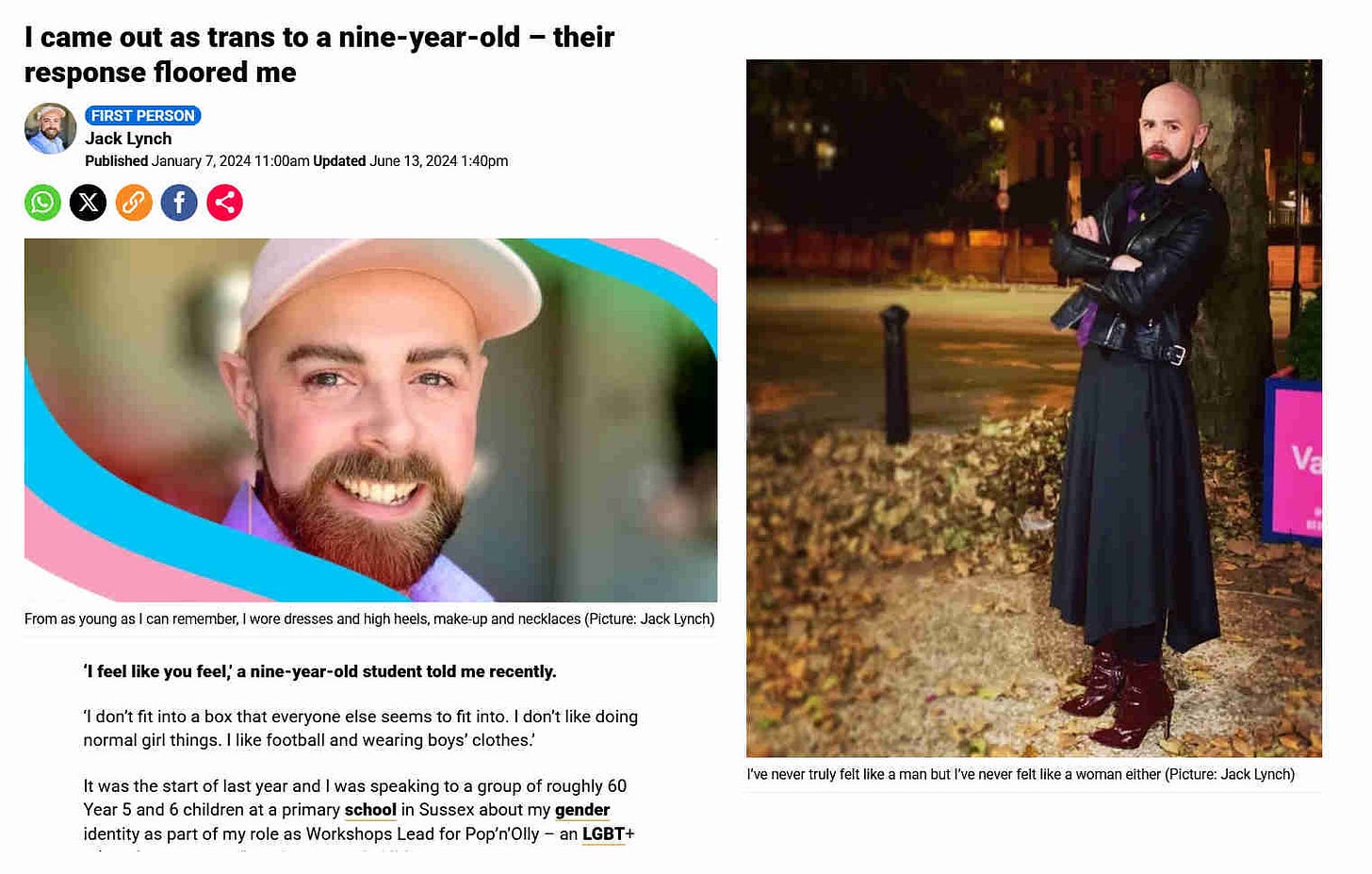

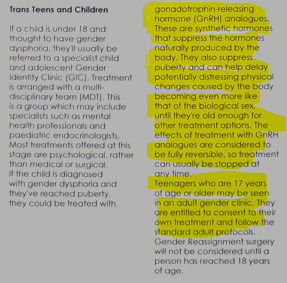

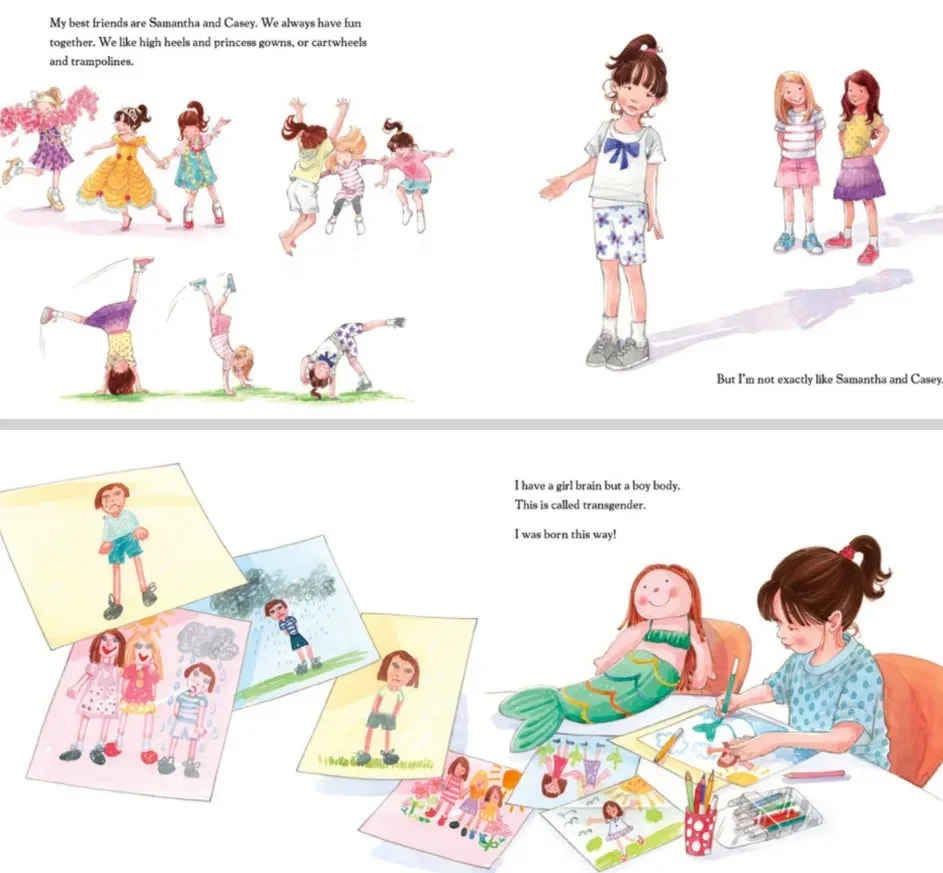
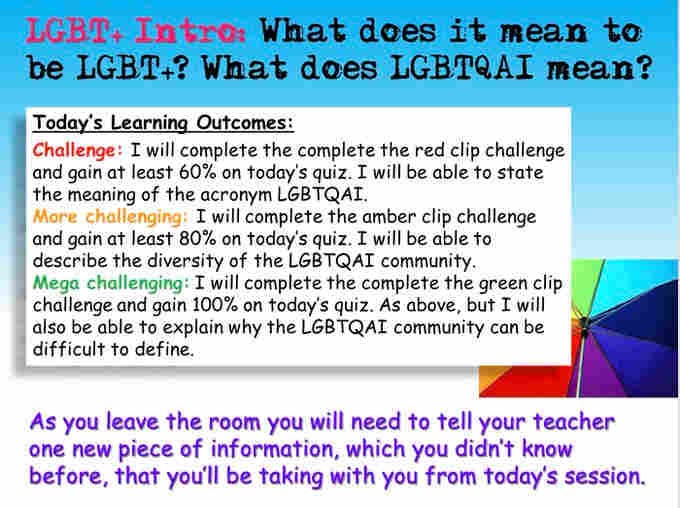
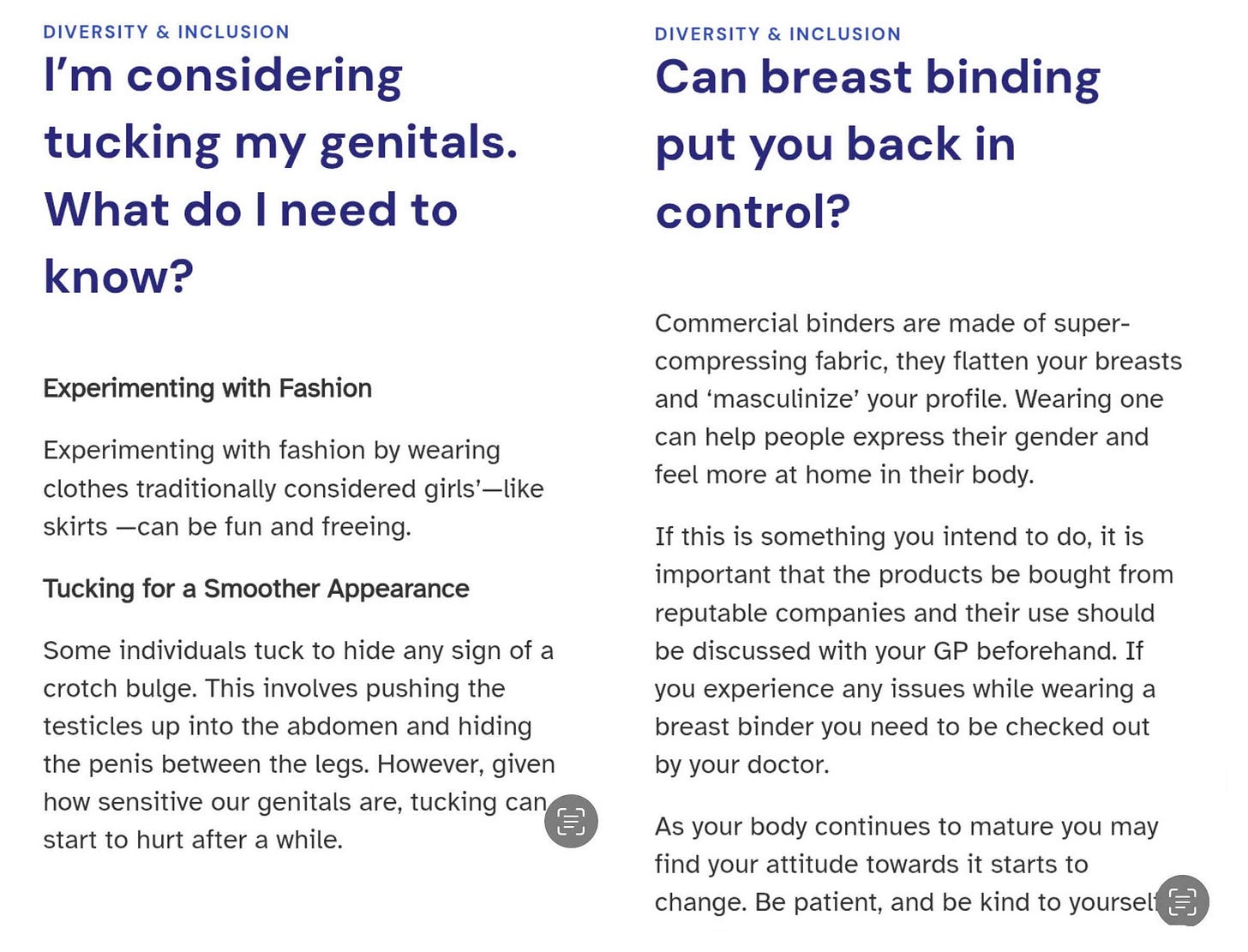
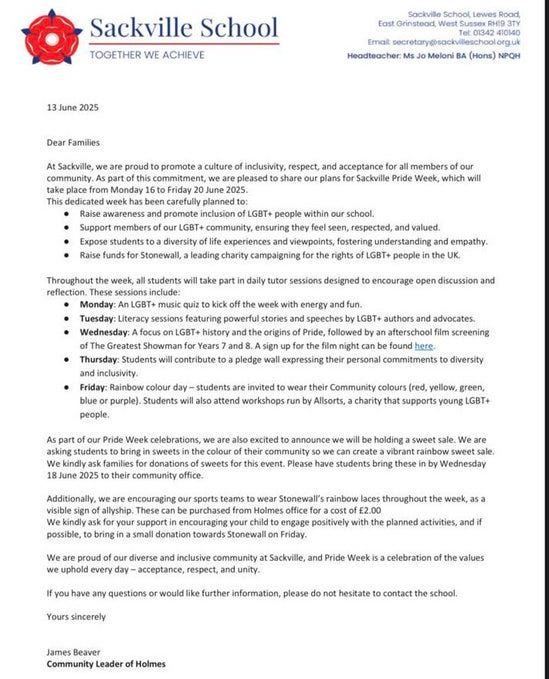
Thank you for drawing attention to this important issue.
Transgender ideation starts when children think they can *be* transgender. We must stop teaching them so.